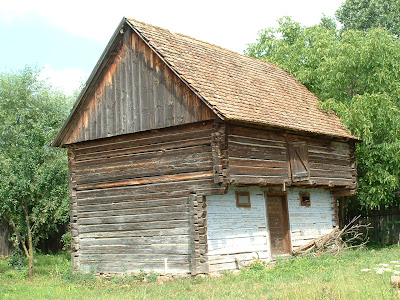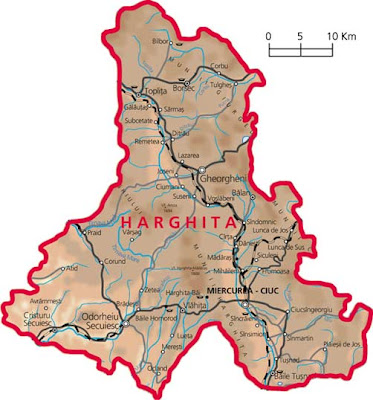 The roof is shingles, and there are basically two rooms. As with all old houses round these parts there is no bathroom (as there is rarely running water).
The roof is shingles, and there are basically two rooms. As with all old houses round these parts there is no bathroom (as there is rarely running water).Why, you may now be asking (having slaked your thirst for knowledge re images) is he showing us this house at this juncture? Well, it's because it's ours. We bought it this week. It's ace. I mean it's utterly knackered and would be politely described as a "fixer upper" by a British estate agent, but we fully intend to fix it up (slowly and surely bit by bit as we have the money to do so). It's in the small village of Csikbankfalva (Bancu in Romanian) which is about 15 kms from here (but on good roads). It is surrounded by 11 ares of land. I had never actually heard the term "are" before I came here, but it's always used for describing the area of properties here (and I have discovered that we do have the term in English, we just don't use it - one are is 100 square metres if you can't be bothered to click on that link).
Anyway, this week, in between apocalyptic rain storms we started cleaning out the barn - didn't I mention the barn? It has a barn. We intend to make the barn something we can live in on weekends while we use the garden, and next year work on the house. It's in better shape than the house and looks like this:
 As we cleaned it out, we happened upon loads of bizarre antiques which would go well in a museum (somebody suggested we should sell them on ebay). Things like old milk pails, knife grinders, various kit for weaving stuff, and a few things that I had no idea what they were. One of them was made from a hollowed out horn and had a hook on it - this turned out to be something you fill with water and hang on your belt, then you put your sharpening stone in it and when you are out in the fields with your scythe, you can sharpen it without going home. Fascinating stuff, hey? (He says, trying to wake everyone up). What would Arthur Negus make of that? (I expect Arthur Negus is dead these days, so he probably wouldn't make much of it, but what would he have made of it when he was alive? Huh? HUH?)
As we cleaned it out, we happened upon loads of bizarre antiques which would go well in a museum (somebody suggested we should sell them on ebay). Things like old milk pails, knife grinders, various kit for weaving stuff, and a few things that I had no idea what they were. One of them was made from a hollowed out horn and had a hook on it - this turned out to be something you fill with water and hang on your belt, then you put your sharpening stone in it and when you are out in the fields with your scythe, you can sharpen it without going home. Fascinating stuff, hey? (He says, trying to wake everyone up). What would Arthur Negus make of that? (I expect Arthur Negus is dead these days, so he probably wouldn't make much of it, but what would he have made of it when he was alive? Huh? HUH?)Oh, and it has an outdoor bread oven too. It's mint.
Anyway, our new house. I'm in Barcelona now, but I'd much rather be in Bankfalva. I'm guessing that is the first time in the history of human thought that that particular sentence has ever seen the light of day.





